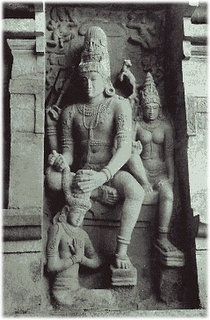
The Tamils were the perhaps the only spoilsports to the myth of India being a peaceloving country without imperialistic intentions.The Cholas raised their Tiger flag in Ceylon,the islands of Indonesia and all in-between. Although this cannot be termed as a full scale invasion,some Indians did once set out of their land with eyes on the soil of distant foreign lands.
The brutal internecine warfare of the South Indian races - Cheras,Cholas,Pandyas, Pallavas have given rise to countless literary works that celebrate courage, invincibility and dauntlessness.But as someone who's always liked to turn over a rock to see whats on the other side,I found this also....
A Young Warrior
- Ponmutiyar (translated by A. K. Ramanujan)
O heart
sorrowing
for this lad
once scared of a stick
lifted in mock anger
when he refused
a drink of milk,
now
not content with killing
war elephants
with spotted trunks,
this son
of the strong man who fell yesterday
seems unaware of the arrow
in his wound,
his head of hair is plumed
like a horse's,
he has fallen
on his shield,
his beard still soft.
And just a curious fact peeping out from the leaves of history: When is a mistake not a mistake? In language at least, the answer to this question is “When everyone adopts it,” and on rare occasions, “When it's in the dictionary.”
The word internecine presents a case in point. It usually has the meaning “relating to internal struggle,” but in its first recorded use in English, in 1663, it meant “fought to the death.” How it got from one sense to another is an interesting story in the history of English. The Latin source of the word, spelled both internecnus and internecvus, meant “fought to the death, murderous.” It is a derivative of the verb necre, “to kill.” The prefix inter- was here used not in the usual sense “between, mutual” but rather as an intensifier meaning “all the way, to the death.”
This piece of knowledge was unknown to Samuel Johnson, however, when he was working on his great dictionary in the 18th century. He included internecine in his dictionary but misunderstood the prefix and defined the word as “endeavoring mutual destruction.” Johnson was not taken to task for this error. On the contrary, his dictionary was so popular and considered so authoritative that this error became widely adopted as correct usage. The error was further compounded when internecine acquired the sense “relating to internal struggle.” This story thus illustrates how dictionaries are often viewed as providing norms and how the ultimate arbiter in language, even for the dictionary itself, is popular usage.

5 comments:
very intersting fact! I anticipated philosophical interpretation ahead for the question poised from the premise you presented : " when is a mistake not a mistake?" which also turned out to be a fact!
hmm, it makes you think when u read this at once :) like it!
when is a mistake not a mistake?
...when everyone adopts it as the truth...
when an authority figure views it as correct
when the people follow and don't question...
they say it's right so it must it true
"war is the only answer"
From the poem "ONE NATION UNDER GOD, INDIVISIBLE, WITH LIBERTY AND JUSTICE FOR ALL ((or so they say))"
found at www.findagoth.com
@ venus-nahhh...very lil time of late for philosophical interpretation a la "if a tree falls in the forest when no one is around, does it make a sound?" See...see...told u - that also makes u think,right? ;-)
@alex: Reminds me of a quote by Jefferson on questioning everything, Alex...even reason!
WOW, GSB one of the top 3s in US, WISH YOU GOOD LUCK!! lemme know how ur i'view goes.. i've been planning 4 GMAT too.. I went to one of the GSB admissions seinars earlier this year, GSB is v GUUUUD! hope to c ya @ chgo soo:)
how ws ur iview?
Post a Comment